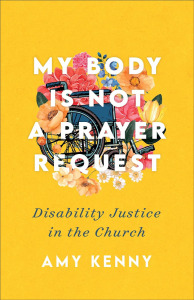Monday, March 4, 2024

 As part of the student fellowship program at the Center for Apologetics and Cultural Engagement, we work with our student fellows to develop book reviews about significant books that overlap their interests with those of the Center. The following review of Amy Kenny’s My Body Is Not a Prayer Request is part of that ongoing initiative.
As part of the student fellowship program at the Center for Apologetics and Cultural Engagement, we work with our student fellows to develop book reviews about significant books that overlap their interests with those of the Center. The following review of Amy Kenny’s My Body Is Not a Prayer Request is part of that ongoing initiative.
“To assume that my disability needs to be erased in order for me to live an abundant life is disturbing not only because of what it says about me but also because of what is reveals about people’s notions of God” (4). This is the heartbeat behind Dr. Amy Kenny’s book My Body Is Not A Prayer Request. In this book, Kenny challenges a belief she believes emanates from the modern Western church: that people with disabilities are seen as disturbances to religious services and simply broken vessels in need of fixing. As a person with a disability herself, Dr. Kenny gives her personal observations on this issue. She does not see that she is any more broken than the able-bodied (or pre-disabled, as she calls it) person. She thinks of herself as a person made whole by the saving work of Jesus and a temple of the Holy Spirit.
When Prayer Hurts: Kenny’s View of Disability Justice
Kenny starts off her book by discussing “disability curatives” (1). In her experience, people without disabilities often quickly resort to suggesting cures for her situation. Throughout this chapter, Kenny laments how others do not see her as a whole human being, but rather as a wheelchair. Throughout high school, she faced discrimination as her school refused to provide the disability accommodations required by the ADA. Against those who doubt the severity or validity of her disability, she argues that disability should be taken seriously and systemic ableism in America must end.
Kenny continues to discuss disability justice and how society and the church ought to provide more avenues to accommodate those who have disabilities. Shining a light on the blessings that come with having a disability, Kenny then shifts to discussing the story of Jacob in Genesis 32. In this passage, Jacob was wrestling with God and incurs a disability. This disability brought peace and transformed his perspective. She believes that those who have disabilities have new perspectives on life and on God that those who are not disabled do not have.
She then discusses microaggressions directed toward those with disabilities. These include phrases like “you should be grateful for your husband… not everyone would put up with your disability” and accusations that she is not really disabled as examples of microaggressions that Kenny has faced (99). Kenny unpacks some of the lessons she has learned over the years living with her disability, including how she deals with others treating her like a “disability superhero” by saying that she is “courageous” or an “angel” (146). She concludes her book by talking about the “disabled God.” By this she means that Christ faced the disability of his suffering on the cross and through that, God understands and empathizes with human disability.
Prayerful Perpetrators? Where Kenny Goes Too Far
While Dr. Kenny tries to challenge the church with what she believes is its systemic ableism, the book contains some significant issues that must be addressed. First, the language used throughout the book often assumes malicious intent. In the first chapter, Kenny uses the term “prayerful perpetrator” to mean someone who approaches her to pray over her disability in hopes that she will be physically healed (1-16). She accuses prayerful perpetrators of violating her because she has no need or desire to be physically healed. In her first chapter alone, she uses this term sixteen times. Each time she references “prayerful perpetrators,” she purports that they see her as a “half-human” or “incomplete soul.” Kenny interprets their prayers as patronizing, “toxic theology” (2). This is a very strong and aggressive claim. By assuming their motive, she condemns their theology.
Kenny also indirectly accuses the Bible of brushing aside those with disabilities. She references the blind man healed by Jesus in John 9 and writes, “I hate that he is not given a name, as though he is unknown and forgotten, not important enough to name… so let’s call him Zechariah, which means ‘God remembers’” (5). In the name of disability justice, Kenny calls out what she believes is ableism within Scripture, editing the words of the Bible to give the blind man a name which was not his own.
Moreover, Kenny ascribes hurt on behalf of the disability community where there often is none. My Body Is Not A Prayer Request is written from Kenny’s personal experience, which is not necessarily a negative thing. However, Kenny uses her experiences and feelings as the standard for all people in the disability community. This is very dangerous because readers might interpret their experiences through Kenny’s worldview and be led to experience hurt where there is none. This is not to say that those in the disability community do not experience harm and discrimination, but not every single person experiences these realities the same way.
Towards a Healing Theology of Disability
Finally, My Body Is Not A Prayer Request is somewhat disorganized, and the purpose of the book does not always remain clear in the midst of the haphazard structure of Kenny’s argument. The second and third chapters mostly tell stories of Kenny’s experiences facing discrimination. While these experiences are helpful to discuss and should be brought to light, the initial purpose of the book is lost in those chapters. At times, this book feels more like a conglomeration of articles about different facets of disability rather than a book about people with disabilities being whole in the saving power of Jesus.
The literature covering disability within the church is rather limited; it is still largely considered a niche topic. Kenny’s My Body Is Not A Prayer Request does provide more literature on this topic and continues to shine a light on the struggles facing the disability community within the Christian church. Nevertheless, I believe that this book might cause more hurting than healing. Kenny had the potential to discuss a very important issue and missed the mark. She uses her own experiences and hurt to argue that all people who are disabled have been outcast and hurt by the church. This is simply not true. As someone who has faced disability head on, I agree that my soul is not any more lost than the next Christian, but it seems to be disingenuous and overreaching to suggest that the church is systemically ableist and seeking to shun those in the disability community.
Elyse Penton is a graduate student at Liberty University pursuing her M.Div. with a focus in biblical languages. She is also a student fellow with Liberty’s Center for Apologetics and Cultural Engagement. Her academic interests primarily center around Koine Greek and New Testament theology. She is also passionate about studying the church’s history with the disability community and practical apologetics to engage today’s culture. Once she graduates with her M.Div., she hopes to pursue doctoral studies. She enjoys reading, classical music, and deep conversations with friends.